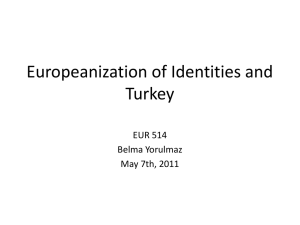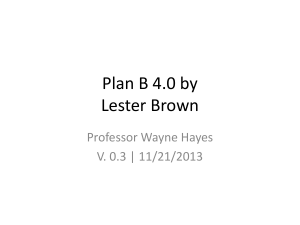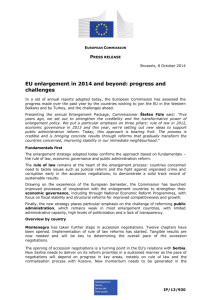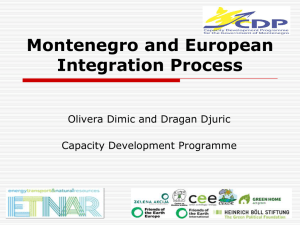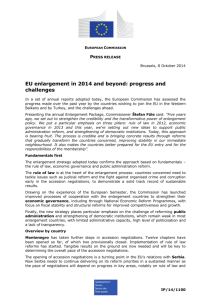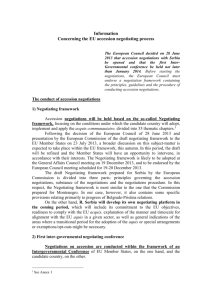The EU`s enlargement process - Center For European Studies
advertisement
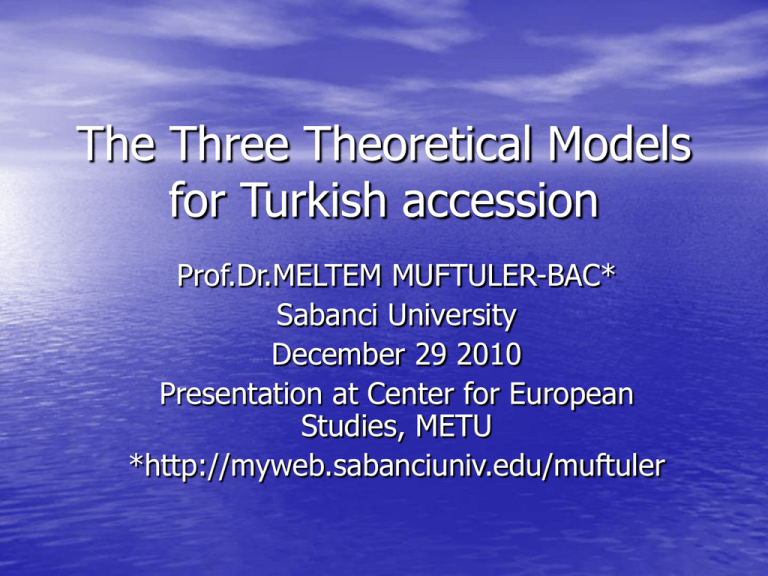
The Three Theoretical Models for Turkish accession Prof.Dr.MELTEM MUFTULER-BAC* Sabanci University December 29 2010 Presentation at Center for European Studies, METU *http://myweb.sabanciuniv.edu/muftuler KEY DATES • • • • • • • September 12, 1963-Association Agreement November 23, 1970-Additional Protocol April 14, 1987-Application for full membership December 17, 1989-Commission Opinion March 6, 1995-Customs Union December 10, 1999-The Helsinki summit and Turkey’s Candidacy October 3, 2005-accession negotiations begin Turkey’s membership • October 2004-Commission recommend accession negotiations • December 2004-The European Council based on the Commission recommendation decided on opening negotiations • October 3, 2005: The GAC opened accession negotiations with Turkey with the adoption of the Negotiations Framework Screening process • The analytical examination of the Turkish ability to adopt the EU’s acquis communaitaire divided into 35 Chapters • Screening began in October 2005completed in October 2006 • At the end of the screening process, there is a screening report for every chapter – needs to be approved unanimously in the Council. Negotiations • misleading as a term-negotiations are over the time period and the financial compensation that the candidate requests • Negotiations could last 10-15 years • Final Accession Treaty- contains the articles decided upon at every round and is subject to approval in the Council, by the EP and all the member states. Accession Negotiations • June 2006-Chapter on Science and Research opened and provisionally • • • • • • • • • closed December 2006- European Council suspended negotiations for 8 chaptersincl.agriculture March 2007-Chapter on Industry and Enterprise Policy opened for negotiations June 2007- two more chapters opened for negotiations-Chapter on Statistics and Chapter on Financial Control December 2007- two more chapters open- Chapter on Consumer and Health protection and Chapter on Trans-European networks June 2008: two more chapters: Company Law and Intellectual Property are opened. December 2008: two more chapters: Free movement of Capital and Media Worlds opened. June 2009: one more chapters-Taxation opened. December 2009: Chapter on Environment opened June 2010:Chapter on Food Safety, Veterinary & Phytosanitary Policy opened • 13 chapters opened. Chapters that are blocked • 2006 December, the European Council froze negotiations • • • • on 8 chapters (incl.agriculture) France blocks financial and budgetary affairs, regional policy, economic and financial policy. Cyprus blocks chapters on energy, judicial rights, justice, freedom and society, foreign security and defense policy, freedom of movement of workers, education and culture. 17 chapters are frozen as of November 2010. Chapters 34 and 35 cannot be negotiatied so that leaves only 3 chapters that could be opened-Social Policy, Public procurement, and competition policy. Utility driven perspectives • Proposition I: The material benefits and costs of Turkey’s membership will determine Turkey’s accession to the EU. • Security related costs/benefits • Economy related costs/benefits • Institutional balances in the EU Norm Driven perspectives • Proposition II: Perceptions of its Europeanness will determine Turkey’s accession to the EU • EU governments and the public would perceive costs and benefits associated with specific countries differently when these candidates are seen as part of the larger European identity. Rights Driven perspectives • Proposition III: The internal dynamics of the EU will determine Turkey’s accession to the EU as a full member. • The end of ‘permissive consensus’ • The elite-public divide over the process of integration Member state preferences • Security related concerns • Economic related concerns • Loss of structural funds • Concerns over deepening vs.widening • Turkey’s population • Culture and identity concerns Turkey’s challenges to the EU • Deepening and developing 2nd pillar • Population-currently 71 million, projected to be 82 million by 2015 • Directly related to that, voting weight of Turkey • Strain on the budget • Culture and identity Obstacles for the near future • Cyprus-end is near for chapters that can be opened-a new deal for 2011? • Visa facilitation regime or visa liberalization-currently negotiations are unfolding • European Defense Agency• The overall crisis in Europe and its impact on the EU’s attractiveness


